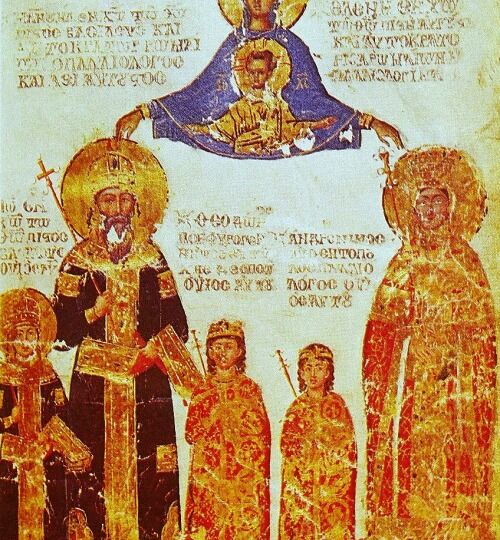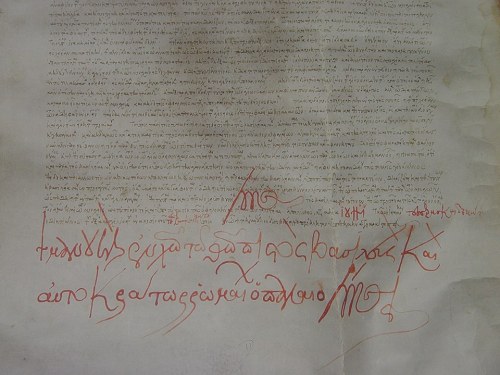
ANAMED Fellow Siren Çelik writes about her quest into the translation in Turkish of Byzantine Emperor Manuel II Palaiologos’s Dialogue with a Persian…
Manuel II Palaiologos (1350‐1425) was a significant political and intellectual figure at the crossroads of Byzantine, Western, and Ottoman history. Born in an age of political upheaval for Byzantium, Manuel faced three civil wars, three sieges of Constantinople, and the continuous shrinking of his territories. His search for help against the Ottomans took him as far as France and Britain. Finally, Manuel was not only an emperor, also an avid author who wrote many literary, philosophical and theological works.
As a side project while at ANAMED, I am translating Manuel’s Dialogue with a Persian into Turkish, with a commentary. This 300 page long Dialogue with a Persian is a theological work penned against Islam. In 2004, Pope Benedict XVI quoted from the French translation of the seventh dialogue against Islam, causing an international scandal, but making Manuel rather famous—at least for a time.
As one of the last Byzantine emperors, Manuel was obliged to accompany the Ottoman army and thus took part in several Ottoman campaigns. One such campaign was the one carried out by Sultan Bayezid in 1391 against the Turkish emirates in Asia Minor. During the winter, the Ottoman army paused in Ankara, where an Ottoman müderris [Islamic scholar], hosted Manuel. The two men held discussions about Islam and Christianity, which the emperor later immortalized in his Dialogue with a Persian. This scholar, possibly Hacı Bayram Veli, still remains a mystery figure.
Debates on religion between Christians and Muslims indeed took place in the 14th and 15th centuries; I do not want to list all the academic arguments here, but there is no reason to believe that the conversations never took place in reality. However, although the Dialogue has its roots in actual conversation(s), Manuel has heavily ‘edited’ these conversations. The majority of the arguments by the müderris have been taken from various Byzantine anti-Islamic treatises and put into this Ottoman scholar’s mouth by Manuel. In contrast, the emperor defeats all the Ottoman arguments and emerges as the undisputed winner of each discussion. As such, although the conversations had indeed taken place, as well as perhaps some of the anecdotes told by the emperor, the dialogue is mostly fiction.
Despite its serious theological debates, the work is an enjoyable read as Manuel does not represent the müderris and his entourage as ‘barbarian’ types often found in Byzantine literature, but in a much more complex manner. Although the müderris is portrayed as the intellectually inferior party, Manuel nevertheless depicts him as a witty, urbane, and kind man; the emperor was clearly taken with his Ottoman collocutor. They have breakfast together, joke around, and talk about the game hunted by Manuel—including a boar, a specimen of the prohibited pork in Islam. This blog entry cannot do justice to the liveliness of the dialogue and the character portrayal.

Manuel’s signature in red ink on an official document.
Translating this work into Turkish will allow many Turkish scholars to access this work composed in difficult Greek, which still doesn’t have an English translation. It provides an entertaining insight into Manuel’s life among the Ottomans and the Byzantine views of Islam, and would be of interest to political, cultural, and intellectual historians. I believe that it deserves a translation also on the account of its literary merit.
I am a great admirer of Classical Greek and Byzantine literature. I decided to become a Byzantinist as a sophomore and thus self-taught Classical Greek as an undergrad. In the beginning, I had learnt Greek merely as a ‘tool’ that would enable me to study Byzantine history. However, as I started reading and translating Classical and Byzantine authors, I began to perceive Byzantine literature in a whole different light. It was a little cosmos of literary eloquence, wit, and multiple layers of meaning, full of works that could be read for pleasure. It was around this time that I had my first encounter with Manuel Palaiologos; I translated a letter he had written from London. This emperor-author intrigued me so much that I later wrote my PhD thesis on him. The Dialogue with a Persian is one of my favourite works by Manuel and I am delighted to be translating it into my native language.
While translating the Dialogue into Turkish, my goal is not only to render the complex Greek into grammatically correct, understandable Turkish, but also to preserve Manuel’s own voice. Every translation has to reflect the author’s own language; if the original text structure is simple with brief sentences, so should be the translation. If it has lots of wordplay, the translator needs to preserve it as much as possible. I have opted for an elevated, at times Ottoman sounding Turkish to capture the elegant, sophisticated voice of Manuel. The translation poses several challenges such as; ‘What to do with the sometimes page-long sentences; how much should the original structure be kept? How to render Homeric allusions or jokes into Turkish? What to do with philosophical and theological terms that have no exact translation?’ Yet, despite everything, I really enjoy this translation work, in a way blending my voice with that of Manuel. Around 1410, the emperor had suggested Guarino of Verona, an Italian scholar, to translate another work of his into Latin or Italian. I hope that being translated into Turkish today would have made Manuel happy and proud.

